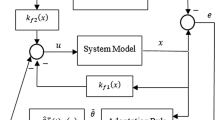Abstract
In this paper, a new direct model reference adaptive control method for nonminimum phase systems is presented. The parameter estimation scheme combines adaptive data filtering with a recursive least-squares algorithm with parameter projection and signal normalization. The problem of minimum phase of the plant is handled by adaptive input output data filtering. This data filtering permits one to relocate the reros of the plant estimated model inside the unit circle and to define a good data model, which is a key issue for robust control. The scheme robustness with respect to unmodeled dynamics is also simultaneously improved. The performance of the control algorithm is illustrated by numerical examples.
Similar content being viewed by others
References
B. D. O. Anderson, R. R. Bitmead, C. R. Johnson, P. V. Kokotivic, R. L. Kosut, I. M. Y. Marceels, L. Praly, and B. D. Riedle,Stability of Adaptive Systems: Passivity and Averaging Analysis, MIT Press, Cambridge, MA, 1986.
H. Butler, G. Honder, and J. Van Amerongen, Reference model decomposition in direct adaptive control.Int. J. Adaptive Control Signal Process., vol. 5, 199–217, 1991.
W. R. Cluett, S. I. Shah, and D. G. Fisher, Robust design of adaptive systems using conic sector theory,Automatica, 23, 221–224, 1987.
B. Egardt, Unification of some discrete time adaptive control schemes,IEEE Trans. Automat. Control, vol. AC-25, no. 2, 693–697, 1980.
B. Egardt and K. S. Narendra,Stability of Adaptive Controllers, Springer-Verlag, New York, 1979.
G. Feng and M. Palaniswami, Robust direct adaptive controllers with a new normalization technique,IEEE Trans. Automat. Control., vol. 39, no. 11, 2330–2334, 1994.
M. Gevers,Essays on Control: Perspectives in the Theory and its Applications, Towards a Joint Design of Identification and Control, pp. 111–151, Birkhauser, Boston, MA, 1993.
F. Giri, M. M'saad, J. M. Dion, and L. Dugard, On the robustness of discrete time indirect adaptive linear controllers,Automatica, vol. 27, no. 1, 153–159, 1991.
R. G. Hakvoot, R. J. R. Schrama, and P. M. J. Van der Hof, Approximate identification with closed loop performance criterion and application to LQG feedback design.Automatica, 30, 679–690, 1994.
A. Hernningsen, Model reference adaptive control and adaptive stability augmentation,Fourth IFAC International Symposium on Adaptive Systems in Control and Signal Processing, Grenoble, France, pp. 323–328, 1992.
I. D. Landau,Adaptive Control: The Model Reference Approach, Marcel-Dekker, New York, 1979.
I. D. Landau and R. Lozano, Redesign of explicit and implicit discrete time model reference adaptive control schemes,Int. J. Control, vol. 33, no. 2, 247–268, 1981.
I. D. Landau and H. M. Silveria, A stability theorem with applications to adaptive control,IEEE Trans. Automat. Control, vol. AC-24, 305–312, 1979.
R. Lozano and R. G. Moctezuma, Model reference adaptive control with unknown high frequency gain sign,Automatica, 29, 1565–1569, 1993.
M. Makoudi and L. Radouane, A robust model reference adaptive control for nonminimum phase systems with unknown or time varying delay.Automatica, 36, 1057–1065, 2000.
R. H. Middleton, G. C. Goodwin, D. J. Hill, and D. Q. Mayne, Design issues in adaptive control,IEEE Trans. Automat. Control, vol. AC-33, 50–58, 1988.
Y. Miyasato, Model reference adaptive control for non minimum phase systems with time delay by periodic feedback,Proceedings of the 30th IEEE Conference on Decision and Control, Brighton, England, pp. 1465–1466, 1991a.
Y. Miyasato, Model reference adaptive control for non minimum phase systems by periodic feedback, inIntelligent Tuning and Adaptive Control, edited by R. Devanathan, Pergamon Press, Oxford, England, pp. 399–404, 1991b.
Y. Miyasato, Model reference adaptive control for non minimum phase systems by 2-delay feedback,Fourth IFAC International Symposium on Adaptive Systems in Control and Signal Processing, Grenoble, France, 1992.
M. M'Saad, M. Duque, and I. D. Landau, Practical implications of recent results in robustness of adaptive control schemes,Proc. 25th CDC, Athens, Greece, 1986.
R. Ortega, L. Praly, and I. D. Landau, Robustness of discrete-time adaptive controllers,IEEE Trans. Autom. Control., vol. Ac. 30, no. 12, pp. 1179–1187, 1985.
N. M. I. Papadakis and C. A. S. Thomopoulos, Improvement performance model reference adaptive control with parameter mismatch compensation,IEEE Trans. Automat. Control, vol. 41, no. 2, 224–228, February 1996.
L. Praly, Commande adaptative par modele de reference: Stabilite et robustesse,Outils et Modeles Mathematiques Pour Lautomatique, Lanalyse des Systemes et le Traitement du Signal, Edition CNRS, pp. 805–816, 1983.
C. Rhors, L. Valavani, M. Athans, and G. Stein,Analytical Verification of Undesirable Properties of Direct Model Reference Adaptive Control Algorithms, MIT, Cambridge, (MA), LIDS-P-1122, 1981.
C. E. Rohrs, M. Athans, L. Valavani, and G. Stein, Some design quidelines for discrete-time adaptive controllers,Automatica, 20, 653–660, 1984.
C. E. Rhors, M. Athans, L. Valavani, and G. Stein, Robustness of continuous time adaptive control algorithms in the presence of unmodeled dynamics,IEEE Trans. Automat. Control, vol. AC-30, no. 9, 881–889, September 1985.
N. R. Sripada and D. Grant Fisher, Improved least-squares identification,Int. J. Control, vol. 46, no. 6, 1889–1913, 1987.
K. S. Tsakalis, Robustness of model reference adaptive controller: an input-output approach,IEEE Trans. Automat. Control, vol. 37, no. 5, 556–565, May 1992.
P. M. J. Van Den Hof and R J. P. Schrama, Identification and control—Closed-loop issues,Automatica, 1995.
C. Wen and J. David Hill, Global boundednesss of discrete time adaptive control just using estimator projection,Automatica, 28, 1143–1157, 1992.
B. E. Ydstie, Transient performance of direct adaptive control with parameter projection.IEEE Proc. of 30th Conference on Decision and Control, Brighton, England, pp. 2848–2852, December 1991.
Q. Zhilima, J. F. Dorsey, and D. M. Dowson, Model reference robust control of a class of SISO systems,IEEE Trans. Automat. Control, vol. 39, no. 11, 2219–2234, 1994.
A. Zinober, Comments on: a simple criterion for stability of linear discrete systems,Int. J. Control, 38, p. 1085, 1983.
Author information
Authors and Affiliations
Rights and permissions
About this article
Cite this article
Mejhed, H., Makoudi, M. & Radouane, L. A robust model reference adaptive control for nonminimum phase systems. Circuits Systems and Signal Process 20, 63–76 (2001). https://doi.org/10.1007/BF01204922
Received:
Revised:
Issue Date:
DOI: https://doi.org/10.1007/BF01204922




